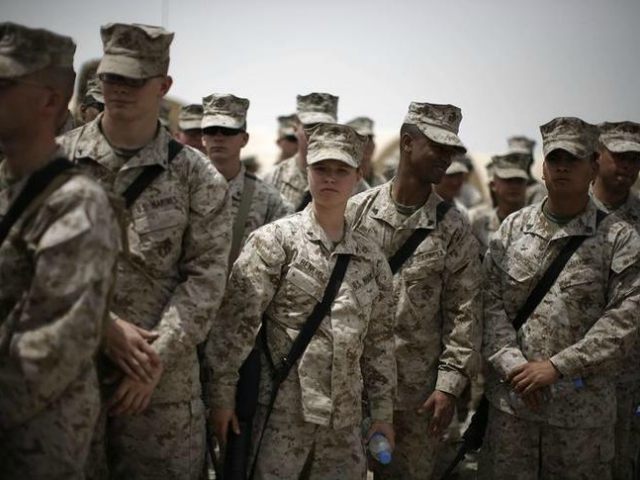All-male ground combat Marine units “demonstrated higher performance levels” when compared to squads with females, revealed a Marine Corps study that examined the implications of integrating women into all ground combat arms occupations and units.
Male units were found to be faster, less injured, and more lethal than gender-integrated squads.
“All-male squads, teams and crews demonstrated higher performance levels on 69% of tasks evaluated (93 of 134) as compared to gender-integrated squads, teams and crews,” revealed the summary of the study released Thursday. “Gender-integrated teams performed better than their all-male counterparts on (2) events.”
Then-Secretary of Defense Leon Panetta, on January 24, 2013, repealed the Direct Ground Combat Definition and Assignment Rule (DGCDAR) that prohibited women from serving in combat units and directed the military departments to implement the changes by January 1, 2016.
Military services can request an exception to Panetta’s order, but so far none has indicated an intention to do so, reported The Hill. That exception would require the approval of the Chairman of the Joint Chiefs of Staff and the Secretary of Defense.
The Congressional Research Service (CRS), in a September 1st report, mentioned that the military branches are in the process of reviewing and validating performance standards. Initial results of their evaluation are expected this month.
Gen. Martin Dempsey, the chairman of the Joint Chiefs of Staff, said, “If we do decide that a particular standard is so high that a woman couldn’t make it, the burden is now on the service to come back and explain to the secretary, why is it that high? Does it really have to be that high?”
“Some believe that even if the validation process shows that current standards for certain occupational series are inappropriate or unnecessarily high, any changes at this particular time would be perceived as a lowering of standards solely for the purpose of including women,” noted CRS. “For example, some are concerned that unit morale or cohesion might be affected if the integration of women under new standards creates the perception that the woman has not ‘earned’ her place or that she is potentially replacing a more capable male soldier.”
According to the study released Thursday, women make up 7.6 percent of the Marine Corps Active Component and 7 percent of the total force.
“Today, female Marines are eligible to serve in 315 of the 337 primary military occupational specialties,” noted the Marine Corps study. “Female Marines have performed superbly in the combat environments of Iraq and Afghanistan and are fully part of the fabric of a combat-hardened Marine Corps after the longest period of continuous combat operations in the Corps’ history.”
“Leveraging the talents of every Marine without restrictions throughout the depth and breadth of what are increasingly more complex operating environments enables a more capable Marine Corps,” it added.
The CRS showed that at least 161 women have lost their lives in the Global War on Terror (GWOT) operations, including 51 in the Afghanistan war theater and 110 in the Iraq war.
Moreover, 1,015 have been injured in action—376 in the Afghanistan war and 639 in the Iraq conflict.
The Marine Corp formed a unit to conduct research for the study released Thursday—the Ground Combat Element Integrated Task Force (GCEITF).
Male units are faster, more lethal as it relates to shooting accuracy, able to carry heavier weights, and more efficient in evacuating casualties, among other things, the study found.
“The Marine Corps must continue to attract, develop, and retain highly talented female Marines to meet current and future challenges throughout the range of military operations,” noted the study.
In 2015, the Army opened its Ranger School to women for the first time on a trial basis. Last month, two females graduated from the program.
“Those opposed to changing restrictions on women in combat roles argue that a lack of combat experience does not adversely affect career advancement and promotions for women,” reported CRS. “They argue further that the progress of women is not the most important issue at hand, and contend that military readiness and national security has been and would further be weakened due to the presence of women in combat units.”
“Those opposed note that close combat situations have and continue to exist and, on average, an all-male unit would be higher-performing in those types of engagements due to physical differences,” it added.
Advocates for opening all military occupations to females argue that it is harder for women to advance to a top-ranking position in the armed services without combat experience.
“In their view, modern weapons have equalized the potential for women in combat since wars are less likely to be fought on a hand-to-hand basis,” reported CRS.

COMMENTS
Please let us know if you're having issues with commenting.